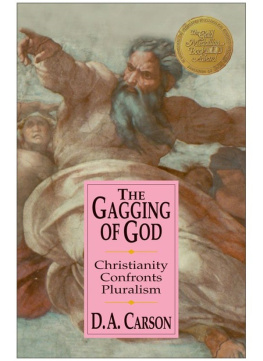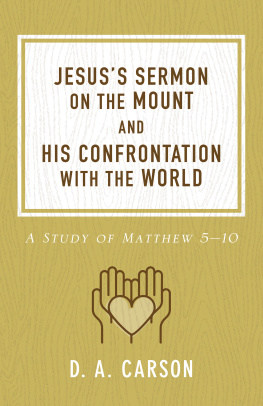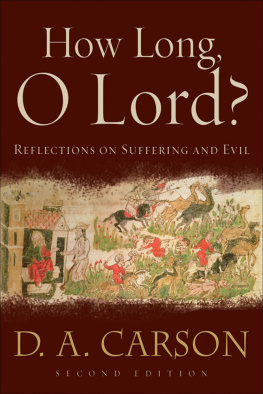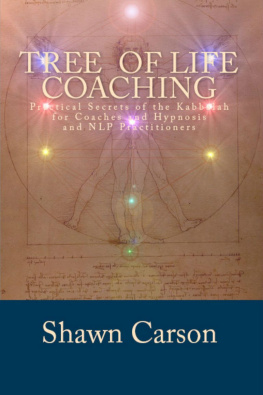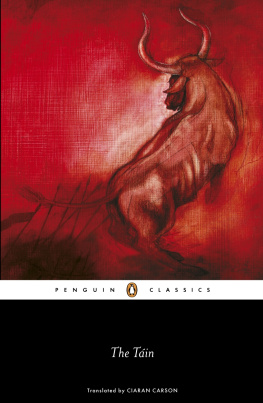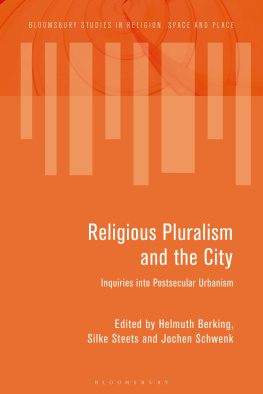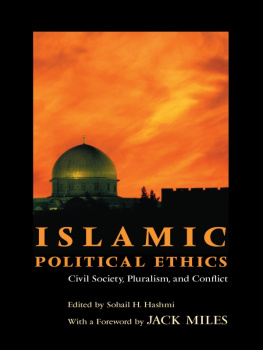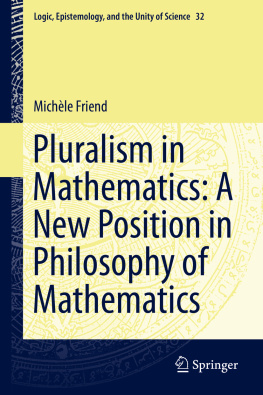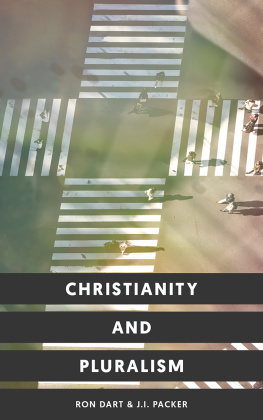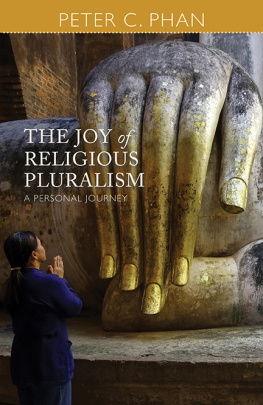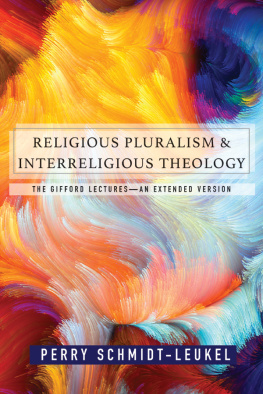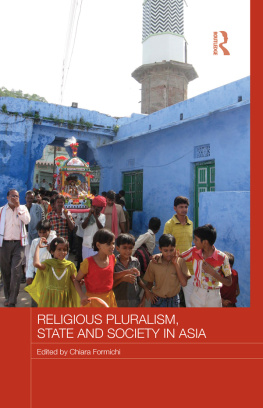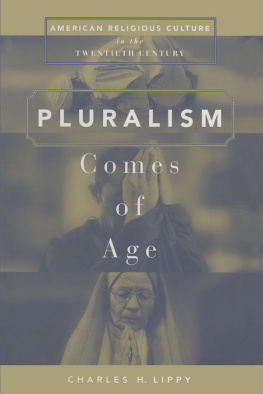Carson - The gagging of God: Christianity confronts pluralism
Here you can read online Carson - The gagging of God: Christianity confronts pluralism full text of the book (entire story) in english for free. Download pdf and epub, get meaning, cover and reviews about this ebook. City: Grand Rapids;Mich, year: 2009;2019, publisher: Zondervan Pub. House, genre: Religion. Description of the work, (preface) as well as reviews are available. Best literature library LitArk.com created for fans of good reading and offers a wide selection of genres:
Romance novel
Science fiction
Adventure
Detective
Science
History
Home and family
Prose
Art
Politics
Computer
Non-fiction
Religion
Business
Children
Humor
Choose a favorite category and find really read worthwhile books. Enjoy immersion in the world of imagination, feel the emotions of the characters or learn something new for yourself, make an fascinating discovery.
The gagging of God: Christianity confronts pluralism: summary, description and annotation
We offer to read an annotation, description, summary or preface (depends on what the author of the book "The gagging of God: Christianity confronts pluralism" wrote himself). If you haven't found the necessary information about the book — write in the comments, we will try to find it.
The gagging of God: Christianity confronts pluralism — read online for free the complete book (whole text) full work
Below is the text of the book, divided by pages. System saving the place of the last page read, allows you to conveniently read the book "The gagging of God: Christianity confronts pluralism" online for free, without having to search again every time where you left off. Put a bookmark, and you can go to the page where you finished reading at any time.
Font size:
Interval:
Bookmark:

Other Zondervan Books by D.A. Carson
From Sabbath to Lords Day
An Introduction to the New Testament (with Douglas J. Moo and Leon Morris)
Telling the Truth (General Editor)
ZONDERVAN
The Gagging of God
Copyright 1996 by D. A. Carson
All rights reserved under International and Pan-American Copyright Conventions. By payment of the required fees, you have been granted the non-exclusive, non-transferable right to access and read the text of this e-book on-screen. No part of this text may be reproduced, transmitted, down-loaded, decompiled, reverse engineered, or stored in or introduced into any information storage and retrieval system, in any form or by any means, whether electronic or mechanical, now known or hereinafter invented, without the express written permission of Zondervan.
ePub Edition OCTOBER 2009 ISBN : 978-0-310-83068-9
Requests for information should be addressed to:
Zondervan, Grand Rapids, Michigan 49530
Library of Congress Cataloging-in-Publication Data
Carson, D. A.
The gagging of God : Christianity confronts pluralism / D. A. Carson.
p. cm.
Includes bibliographical references and index.
ISBN : 0-310-24286-X (Softcover)
1. TheologyMethodology. 2. Theology, DoctrinalHistory20th century. 3. Religious pluralism. 4. Salvation outside the church. 5. HermeneuticsReligious aspectsChristianity.
I. Title.
kBT118.C37 1996
230.01-dc20
95-36458
All Scripture quotations, unless otherwise indicated, are taken from the Holy Bible: New International Version. NIV. Copyright 1973, 1978, 1984 by International Bible Society. Used by permission of Zondervan. All rights reserved.
Edited by Elizabeth Yoder
Interior design by Joe Vriend
05 06 07 / DC/ 10 9 8 7 6 5 4
Information about External Hyperlinks in this ebook
Please note that footnotes in this ebook may contain hyperlinks to external websites as part of bibliographic citations. These hyperlinks have not been activated by the publisher, who cannot verify the accuracy of these links beyond the date of publication.
This one is for Tiffany and Nicholas, not because they can as yet understand much of it, but because in a few years they will need it.
My interest in the subject of pluralism springs from several quite different kinds of experiences. The first is the ever present need to understand ones own culture. The need appears all the more pressing to those who move from culture to culture: their mobility exposes them to great diversity in outlook, eventually prompting them to wonder what makes their own world tick. The need appears no less challenging to those who enjoy reading biographies and other historical studies: as we form opinions about past movements and periods, we begin to wonder what people will one day say about our own culture and period of history. Of course, hindsight is considerably overrated: it is not characterized by anything like the acuity that some people assign to it. Nevertheless, hindsight is far more accurate than prognostication about the future (that most disreputable fancy of horoscopes and social sciences); it is also more perceptive than most assessments of the present. Since we live in the present, however, the present is what we must try to understand, no matter how much we try to shed light from the past on the subject. And the one common theme of the great majority of commentators who seek to define Western culture at the end of the twentieth century is pluralism. Inevitably, then, I have been drawn into the vast literature on this subject, and find myself wrestling with it.
The second kind of experience that has pushed me to think about these matters arises from my vocation as a Christian teacher. For years I have taught courses in hermeneutics. I have watched hermeneutics change from the art and science of biblical interpretation to the new hermeneutic to deconstruction, with many stopping places along the journey and many interesting side roads. Everyone who has thought about these things has soon recognized that many forms of contemporary pluralism are tied to certain approaches to hermeneutics. A Christian teacher cannot think long about the former without reading more widely in the latter. As an antidote to the arrogant claims of positive knowledge common a century ago, the new hermeneutic is refreshingly restrained. Yet just when it might be expected to teach us humility, it has become the most imperious ideology of our day. It threatens us with a new ideological totalitarianism that is frankly alarming in its claims and prescriptions.
The third kind of experience that has nudged me to reflect on the characteristics of contemporary pluralism derives from my vocation as a Christian preacher. For example, university missions must today deal with approaches and outlooks substantially different from anything I faced as an undergraduate thirty years ago. Many of these differences are nothing other than the outworking of one form or another of pluralism, both in the academic world and in the culture at large.
I am writing as a Christian. In my most somber moods I sometimes wonder if the ugly face of what I refer to as philosophical pluralism is the most dangerous threat to the gospel since the rise of the gnostic heresy in the second century, and for some of the same reasons. Part of the danger arises from the fact that the new hermeneutic and its assorted offspring are not entirely wrong: it would be easier to damn an ideology that was wholly and pervasively corrupt. But another part of the danger derives from the harsh reality that, as far as I can see, the new hermeneutic and its progeny are often profoundly wrong and so popular that they are pernicious. In a happier frame, I suspect that giving voice to such suspicions will sound much too dour and in any case, the truth is that I am ill equipped to make such a judgment. Besides, postmodernism is proving rather successful at undermining the extraordinary hubris of modernism, and no thoughtful Christian can be entirely sad about that. In any case, that the contemporary challenges are extraordinarily complex and painfully serious cannot reasonably be gainsaid.
The complexity of the subject leaves an author with a difficult choice. One may opt for a popular book that surveys a lot of material superficially, or one may opt for a profound probing of one small part of the subject. I have managed to err in both ways simultaneously: much of this book paints with a fairly broad brush, but here and there I worry away at particular aspects of the challenge, poking beneath the surface to grapple with a few questions that strike me as more urgent, or perhaps less well evaluated in the literature. If anything in the following pages equips some Christians to intelligent, culturally sensitive, and passionate fidelity to the gospel of Jesus Christ, or if it encourages some thoughtful unbelievers to examine the foundations again and so to find that Jesus is Lord, I shall be profoundly grateful.
Perhaps it will help some readers if I acknowledge that chapters 2 and 3 are the most theoretical. If they are initially too difficult, skip them. Although they lay a foundation for the rest of the book, the later chapters can be read with profit without them.
Some of the material in these pages has been grist for lectures delivered in Cambridge, England; Erskine Theological Seminary, South Carolina; the Graduate Student Fellowship in Wisconsin and in Michigan; and elsewhere. In particular, some of the material found here first saw the light of day in one of three essays: Christian Witness in an Age of Pluralism, in
Font size:
Interval:
Bookmark:
Similar books «The gagging of God: Christianity confronts pluralism»
Look at similar books to The gagging of God: Christianity confronts pluralism. We have selected literature similar in name and meaning in the hope of providing readers with more options to find new, interesting, not yet read works.
Discussion, reviews of the book The gagging of God: Christianity confronts pluralism and just readers' own opinions. Leave your comments, write what you think about the work, its meaning or the main characters. Specify what exactly you liked and what you didn't like, and why you think so.

